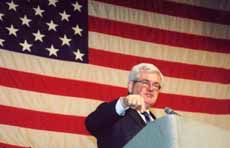

The differences between Newt Gingrich and James Carville were evident from the beginning of their lecture in Regents Hall Oct. 9.
After the crowd welcomed both speakers with a standing ovation, Carville slipped out of his suit jacket and rolled up his sleeves. Gingrich opted to keep his jacket on and took a seat in one of the high-back chairs on stage.
Carville started his opening remarks off with jokes and anecdotes about being pulled over in Virginia, arguments with his wife, Mary Matalin, who is currently an advisor to President Bush, and his education.
“I don’t know if you know this or not, but the Speaker is a Ph.D. from Tulane University where he graduated cum laude,” said Carville. “And I have a bachelor’s degree from Louisiana State University where I graduated thank the lordy.”
Gingrich later joked that despite having served as Speaker of the House of Representatives and helping create the Republican Contract with America, “I’m now essentially a straight-man for James Carville.”
Carville quickly switched gears to discuss issues revolving around the Middle East, calling it a situation, not a problem.
“Now let me tell you there’s a difference between a problem and a situation,” said Carville. “A problem we can fix. A situation you have to live with.”
Carville, who was born in Louisiana, used the image of a swamp full of mosquitoes to help illustrate his point.
“Growing up in Louisiana we [had] a lot of mosquitoes. And if a mosquito lands on you, you have to swat it, it hurts, it’s annoying,” he said. “But anyone that lives in a subtropical climate will tell you that you will never get ahead at swatting mosquitoes. You have to drain the swamp, or you have to live with the swamp.”
“We have to be at war against al Qaeda, but we also have to be very aggressive in doing the things that we can do to cut down on the production of mosquito’s over there,” he said.
Carville said the United States’ “addiction” to the Middle East and its resources needs to be broken and by doing so, the environment will also benefit.
He said technology is improving and finding ways to deal with issues involving the environment, but solutions may not come soon enough.
Gingrich began his opening remarks addressing Carville’s statement about the environment.
He called a hydrogen-fueled car, introduced by Daimler Chrysler, “a remarkable potential breakthrough” that has the potential to alter current environmental projections.
“I don’t say that just to be blindly an optimist about technology,” he said. “But I would suggest that for at least 300 years the general pattern of modern society has been for science to develop new solutions at a rate faster than people identified the problem.”
He also commented on the “down side” of technology.
“The second half of that, though, is that evil does exist in the world, that there are opposing belief systems that are not compatible, that the rise of weapons of mass destruction, which is the down side of technology and science, is real.”
He said the U.S. has to be “engaged” and if not, might end up in “dangerous” circumstances
“In effect, if we are not over there, they proved [with] Sept. 11 they will be here,” he said.
Gingrich said a careful distinction must be made between modern Islam and reactionary Islam.
He directed his comments to the women in the audience.
“If you are prepared to give up the right to vote, the right to drive, the right to shop if you’re not accompanied by a male member of your family, the right to not have your daughter killed in an honor killing. If you’re prepared to give all these things up, then we might be able to cut a deal with reactionary Islam,” he said.
“The act of your existence is an attack [if you belong to reactionary Islam],” he said.
Among the topics brought up by audience members and discussed by the speakers during the question and answer portion of the lecture were the privatization of Social Security, Congressional stalemates, the president’s role in the economy and the current state of race relations in the U.S.
The crowd booed once during the evening in response to an audience member’s suggestion that al Qaeda would not have attacked the U.S. had Al Gore been elected president in 2000.

